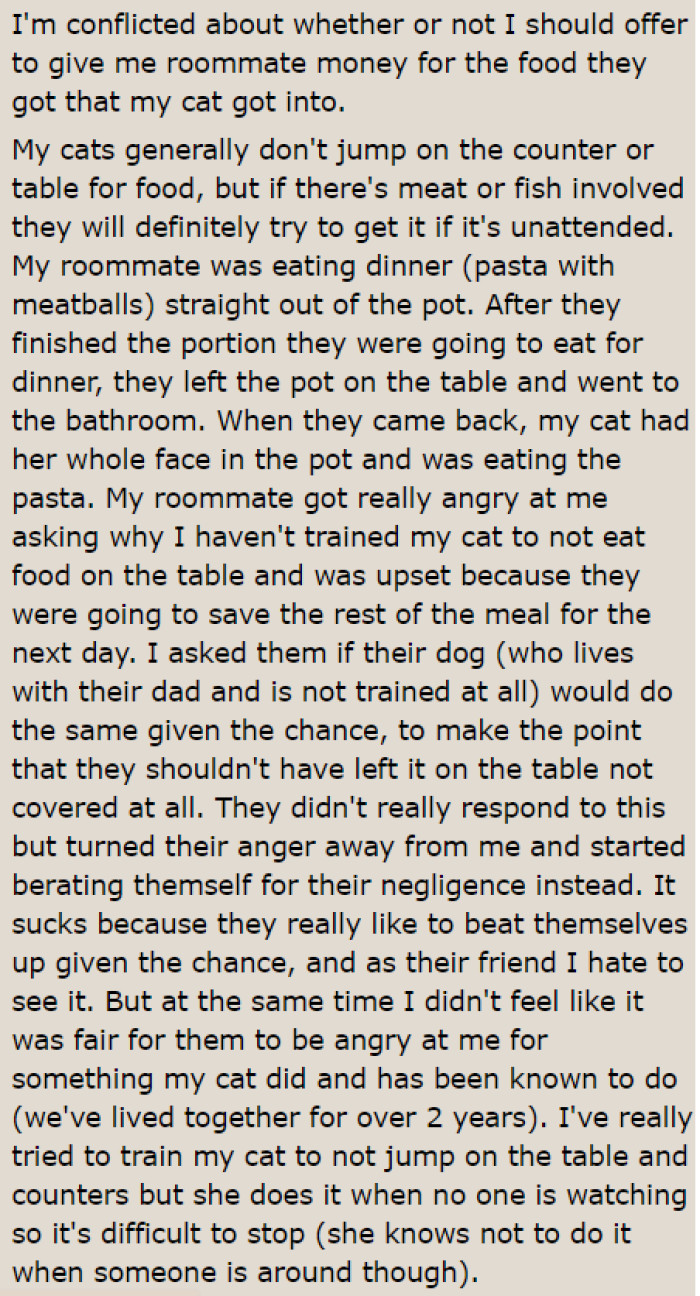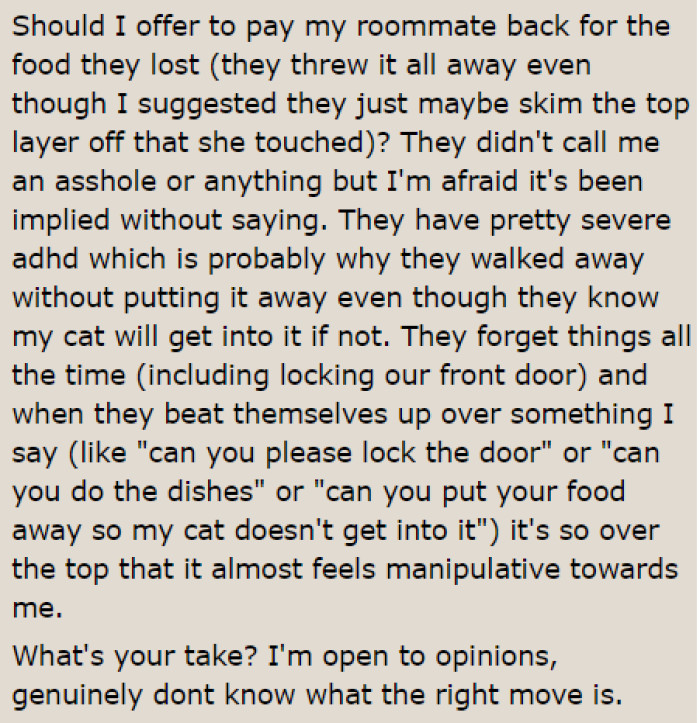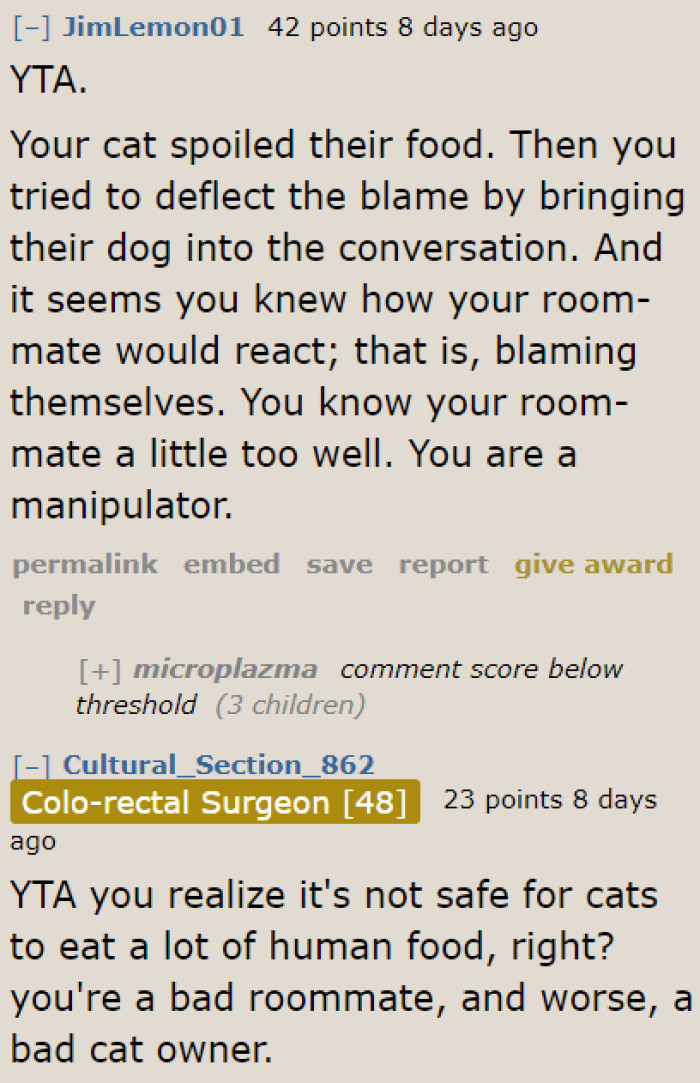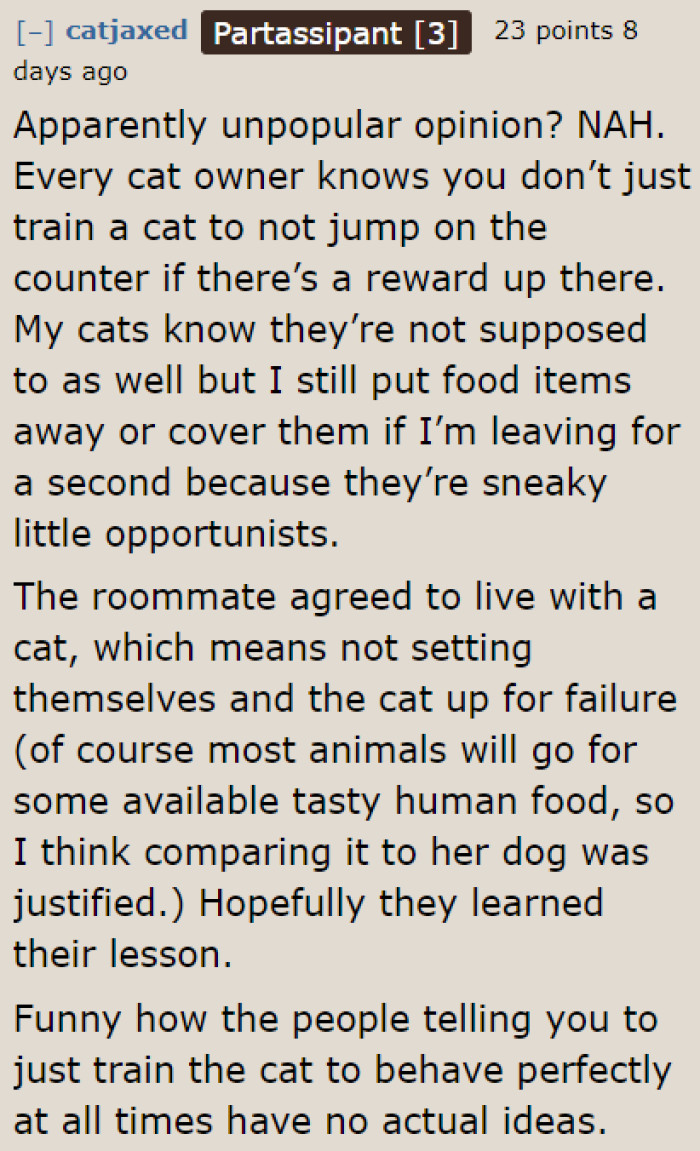Reddit Debates On Should The Cat Owner Pay The Roommate Back For The Food Their Cat Ate
Although cats are pretty chill, their cunning and mischievous personalities can remain no matter how much you train them. Hunting is part of their instincts.
So, if you leave food unattended, they're bound to steal it. And since cats are incredibly agile and resourceful creatures, owners will find it even more challenging to outsmart them. They seem to have an uncanny ability to find the most inconvenient places to perch or hide, often surprising their owners with their clever escapades.
Felines are always curious, and they have an insatiable urge to explore every nook and cranny of your home. It's not uncommon to find them investigating cabinets, climbing onto high shelves, or squeezing into tight spaces.
It's not surprising for them to try to reach for your food when you're not around. Today's story is about a cat owner whose pet ate their roommate's food while it was unattended.
According to the original poster (OP) who shared their story on the "Am I The A**hole?" (AITA) subreddit, the roommate had pasta with meatballs. The food was left in the pot when the cat ate it.
After what happened, the roommate expressed frustration with the owner, suggesting that they should have trained their cat. The owner countered by posing a hypothetical scenario: What if their own untrained dog had been in a similar situation?
Now, the OP is wondering if they ought to pay for what their cat ate.
A cat owner faces a problem with a roommate after their cat ate the latter's food.

When the roommate's food was left unattended, the OP's cat ate it.

The cat owner is contemplating whether or not to give money to their roommate for the inconvenience.

Understanding Animal Behavior
Pet ownership often reveals unique behavioral dynamics between humans and animals. Research indicates that pet owners frequently anthropomorphize their pets, attributing human-like emotions and intentions to them, which can lead to misunderstandings about their behavior. According to Dr. Alexandra Solomon, a relationship therapist, "When we project our feelings onto our pets, we can misinterpret their actions, especially in situations like food theft." Recognizing this tendency can help owners navigate conflicts more effectively, as noted by Dr. Daniel Gilbert, a happiness researcher, who states, "Understanding our biases is key to improving our interactions, whether with people or pets."
Building Trust and Cooperation
Trust is a cornerstone of any relationship, including those shared by roommates. According to findings in the field of social psychology, trust can be cultivated through consistent, open communication and shared experiences. Dr. Jonathan Haidt, a social psychologist, emphasizes that "trust is built through vulnerability and shared experiences," which can be particularly relevant in roommate dynamics. The cat owner might consider offering to replace the eaten food or discussing ways to prevent future incidents, fostering a cooperative environment. For more insights, you can visit Dr. Haidt's professional website at jonathanhaidt.com.
Understanding Responsibility in Shared Living Spaces
Dr. Melissa Green, a social psychologist at the University of Michigan, notes that shared living situations often bring issues of responsibility to the forefront.
When one roommate feels that their responsibilities are not being met, it can lead to resentment and conflict.
Research indicates that establishing clear boundaries and expectations is essential for maintaining harmony in shared spaces.
Deflecting the blame: Is the OP an a-hole after the incident?

One Redditor believes no one is at fault here.
Most people can't stop their cats from eating food that's not kept properly.

Even some cat owners agree that there's no way to stop a cat from stealing food, no matter how much you train them.

According to Dr. John Archer of the University of Central Lancashire, pet ownership can influence social dynamics. When conflicts arise, like food theft by a pet, it often leads to disputes among roommates.
Research suggests that shared responsibilities can mitigate these tensions. Establishing clear agreements on food management and pet care can provide both parties with a sense of fairness and reduce potential resentment.
Open dialogues about expectations are critical in maintaining harmonious living arrangements.
According to studies published in the Journal of Social Psychology, disagreements over shared responsibilities can create significant stress among roommates.
Understanding these dynamics can help individuals navigate their relationships with greater empathy and understanding.
Proactive communication can often prevent misunderstandings and promote a healthier living environment.
The roommate needs to get used to the cat and be careful next time, according to this Redditor.

People who live with a cat should know better than to leave their food exposed.

Since it's the OP's cat, the OP still needs to pay them back for the inconvenience caused by their cat.

The Role of Communication
Effective communication is essential in resolving conflicts, especially among roommates. According to Dr. Tara Brach, a prominent psychologist and meditation teacher, "When we communicate openly and with compassion, we create a space for understanding and collaboration." This aligns with the idea that expressing feelings can lead to healthier relationships. The cat owner should consider discussing their roommate's feelings about the food theft, emphasizing empathy and understanding to reach a resolution.
The Role of Communication in Conflict Resolution
Effective communication is key to resolving conflicts in shared living situations.
Research shows that individuals who engage in open discussions about their concerns are more likely to reach mutually agreeable solutions.
Practicing assertiveness and active listening can significantly enhance these discussions.
Others believe that cats can be trained to stay away from food and counters.

To appease the roommate, the OP should just pay up.

A simple solution

A behavioral psychologist from Yale University notes that effective conflict resolution often involves a blend of empathy and negotiation skills. When discussing issues related to pet behavior, it’s important to validate each other's feelings.
Research suggests that acknowledging the roommate's frustration can create an atmosphere of cooperation, making it easier to find a solution. Consider proposing a shared responsibility plan for pet care, which could prevent future conflicts and enhance the living experience for both parties.
To foster a healthier roommate dynamic, individuals should consider establishing a system for shared responsibilities.
Regular check-ins can also help address issues before they escalate into larger conflicts.
Creating a shared calendar or chore chart can provide clarity and reduce the likelihood of misunderstandings.
If the OP won't offer monetary compensation, then they should just replace it with another meal.

It can be hard to prevent cats from stealing food. Since the OP and their roommate are already aware of the cat's tendencies, they should keep the food properly stored moving forward.
As for the compensation, it entirely depends on the OP. They can either pay for it or buy their roommate a nice meal.
If they don't offer anything back, they'd be considered the a-hole.
Psychological Analysis
This situation illustrates the common challenges of shared living dynamics, particularly around responsibility and communication.
Proactive discussions about expectations can help mitigate conflicts and foster a more harmonious living environment.
Analysis generated by AI
Analysis & Alternative Approaches
Understanding the dynamics of shared living spaces can lead to healthier relationships among roommates.
Experts emphasize the importance of communication and responsibility in preventing conflicts.
Ultimately, fostering a supportive environment is key to successful cohabitation.
Psychological Analysis
This situation highlights the importance of clear communication and shared responsibility in co-living situations. The cat owner's contemplation about compensating the roommate reflects a desire to maintain harmony, showcasing how social living often requires compromise and understanding. Ultimately, the best course of action might be open discussion to set expectations about dealing with the pet's behavior in the future.
Analysis generated by AI
In summary, addressing conflicts arising from pet behavior requires effective communication, trust-building, and shared responsibilities. Research from various psychological studies emphasizes the significance of these elements in promoting healthy relationships.
By recognizing the behavioral tendencies of pets and openly discussing feelings, roommates can navigate challenges more effectively. Implementing collaborative solutions not only resolves immediate issues but can also strengthen overall bonds, creating a more harmonious living environment for everyone involved.



